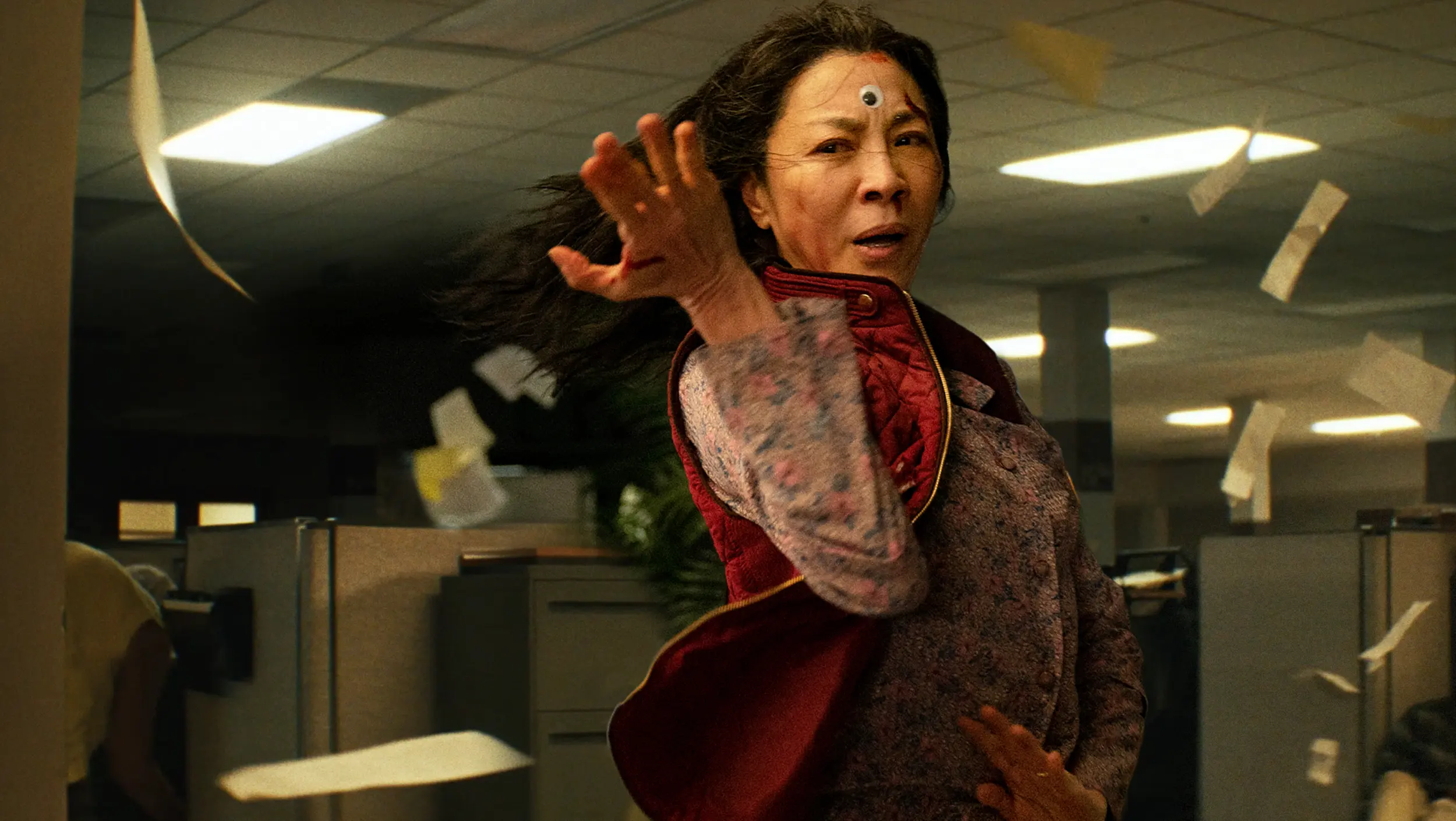Reflecting on Everything Everywhere All at Once
My thoughts on Everything Everywhere All at Once, the nature of reality, the endless tug of war between purpose and nihilism, and finding meaning in the absurd. Image © A24 Films.
This post contains some spoilers for Everything Everywhere All at Once 🔗. If you haven’t seen it yet, please go watch it!
I’ve had a chance to sleep and reflect on Everything Everywhere All at Once. It’s crazy how well-made movies can have such a strong impact on thoughts. I guess it comes down to storytelling—the best stories are the ones that stick with you, and the best storytellers are the ones who can tell those stories while entertaining you at the same time. Everything is heavy-handed about its morals, but it knows this, and it pokes fun at its own nature as a medium for sharing morals. For example, there’s a part where Evelyn (the main character) just got done kung-fu fighting a bunch of people, and Waymond (her husband) stops her before screaming (at her and the audience) to “BE KIND!” It shatters the fourth wall and giggles madly as all the little fragments crash to the ground.
There were a few immediate takeaways for me. There’s the obvious one: every choice we make creates a web of possible realities: one where we make the choice, one where we don’t make it, one where we make a different choice, etc. Each of these branches leads to a completely new web of realities. On the one hand, it’s easy to look at this and think that nothing matters or has any meaning, because no matter what you do, there will always be an equally valid different version of you doing something else. There will always be a universe where you’re happy and successful, and it’s easy to conclude that there’s no point in continuing in a universe where you’re sad and miserable. The flip side of that is that there’s an incredible small chance of your current reality existing, which makes it unique and beautiful, so you should focus your attention on doing the best you can given the circumstances.
There’s a clear parallel to depression IMO, especially with Joy’s (the daughter’s) main goal of annihilating herself and everything everywhere, all at once. Nihilism is seductive for people who don’t have anywhere else to turn, who feel the very nature of their existence is a prison with no escape. We think we’ve seen it all—past, present, future, and all of the alternatives in between—and feel like it’s not worth it, that the amount of pain and suffering and dissonance we experience far outweighs the brief fleeting moments of joy and understanding and appreciating that pop up in between. Who could treat reality seriously knowing there’s a universe out there where we have hot-dogs for fingers?
But that’s not the point. The point is there is no point.
This is the world that exists today. Whether it’s by the design of some mysterious intelligent being, or just a randomly produced inevitability built over time by a series of opaque physical laws, none of that matters. What does matter is what’s real right now. Emotions are real, not because we can describe them scientifically, but because we feel them. Relationships are real not because someone said we have to love each other, but because we do. Annihilation is always an option, but it’s not an inevitable option. There are other choices.
Because nihilism seems like the most logical destination, it’s hard to live in a way that positively embraces it. It’s easy to say “I recognize that nothing matters and embrace the freedom that provides, so I’ll do my best to make life as enjoyable as possible”, but it’s incredibly hard to embody. It’s even harder when you’re fighting against your own mind. Yes, love and joy and human connections are real, but so is exhaustion. So is depression. So is anxiety and hate and despair. How do you reconcile those with wanting to make this the best possible reality? How do you decide which of these very real emotions is more worthy of your attention? What happens when the harmful feelings start getting stronger? How do you balance them out so they don’t consume you, while also recognizing that there’s no greater purpose to any of them?
My guess: you realize that you have a choice, and that choice can greatly influence the future not just for yourself, but for the people you love. You realize that even though this reality is ugly and feels wrong and probably doesn’t have a good ending, it’s still reality, and the feelings it evokes are real. It’s also incredibly malleable. The tiniest changes can have enormous impacts. Even if some decisions lead to annihilation in the Everything Bagel, there’s still an entire multiverse out there with branching pathways and decisions that lead to happiness, or at least acceptance. This is why every branch is important, why they all have value, and why things that seem dire are never permanent.
When things seem awful and annihilation seems like the only way out, stick a googly eye on something, and laugh at the absurdity of it all.
| Previous: "How to run a virtual machine on Kubernetes using KubeVirt" | Next: "NixOS: What is it, how does it work, and should you use it?" |

